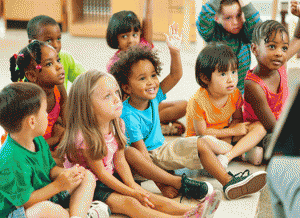
The importance parents place on their children having certain skills before entering kindergarten influences what they do to prepare them. Often parents’ school-readiness beliefs relate only to academic skills. However, education researchers actually measure cognition and general knowledge, language development, approaches toward learning, social and emotional development, physical well-being and motor skills to assess school readiness. So, are parents’ efforts to prepare their kids for kindergarten paying off?
Jaime Puccioni uses information about a nationally representative group of children to investigate how parents’ school-readiness beliefs are related to learning activities done with children, what Puccioni calls “transitional practices,” and to children’s growth in reading and math from kindergarten through first grade. To assess readiness beliefs, parents were asked how important it is for their children to be able to do things like count, draw, recognize the letters of the alphabet, communicate, stay calm, and share, for them to be ready for kindergarten. Then they were asked how often they use eight transitional practices–reading books, telling stories, singing songs, playing games or puzzles, playing sports, teaching about nature, making art, and building things together.
Unsurprisingly, Puccioni found that parents who saw school readiness as more important engaged in more transitional activities, and that those who engaged in more transitional activities had children with higher achievement scores at the beginning of kindergarten. But less intuitive was her finding that affluent parents in the study engaged in more transitional activities, though parents of all social classes valued the importance of readiness equally. That social class made a difference suggests that intervention programs teaching parenting practices could benefit from addressing parents’ school readiness beliefs and expectations (and from making some of these practices more affordable).
You can read the full article here:
Jaime Puccioni. (2015). Parents’ Conceptions of School Readiness, Transition Practices, and Children’s Academic Achievement Trajectories. The Journal of Educational Research, 108(2), 130-147.
Amy August is a graduate student in Sociology at the University of Minnesota who studies education, parenting and childhood, sports, and competition.




Comments